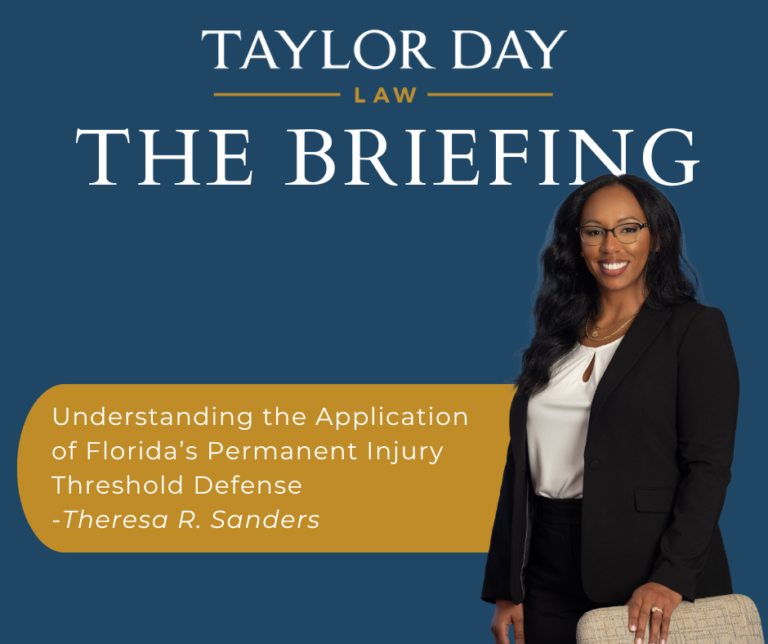Automobile owners in Florida are required to carry personal injury protection (“PIP”) coverage in accordance with 627.737 and “this section rewards them for doing so by exempting them from liability for noneconomic damages except in cases involving permanent injury or death.” Dauksis v. State Farm Mut. Auto. Ins. Co., 623 So.2d 455 (Fla.1993). Section 627.737 dictates that non-economic damages in a tort action arising from a motor vehicle accident are not recoverable when a Plaintiffs are unable to prove they suffered a permanent injury. Section 627.737(2) provides in pertinent part:
[A] plaintiff may recover damages in tort for pain, suffering, mental anguish, and inconvenience because of bodily injury, sickness, or disease arising out of the ownership, maintenance, operation, or use of such motor vehicle only in the event that the injury or disease consists in whole or in part of:
(a) Significant and permanent loss of an important bodily function.
(b) Permanent injury within a reasonable degree of medical probability, other than scarring or disfigurement.
(c) Significant and permanent scarring or disfigurement.
(d) Death.
This permanent injury threshold defense is available if security has been paid by purchasing a PIP insurance policy in the State of Florida. Based on the language of the statute, it is clear that the threshold defense is available to Florida policyholders – as PIP coverage is mandatory for all policies of insurance issued for vehicles with four wheels in Florida. The threshold defense is not available, however, to non-residents who own and operate a vehicle in Florida without the requisite coverage. However, Florida courts have held that the threshold defense is available for non-residents who pay for a policy of insurance in another state that mirrors Florida’s PIP policy structure.
Section 627.737(1) provides that:
(1) Every owner, registrant, operator, or occupant of a motor vehicle with respect to which security has been provided as required by ss. 627.730-627.7405, and every person or organization legally responsible for her or his acts or omissions, is hereby exempted from tort liability for damages because of bodily injury, sickness, or disease arising out of the ownership, operation, maintenance, or use of such motor vehicle in this state to the extent that the benefits described in s. 627.736(1) are payable for such injury, or would be payable but for any exclusion authorized by ss. 627.730-627.7405, under any insurance policy or other method of security complying with the requirements of s. 627.733, or by an owner personally liable under s. 627.733 for the payment of such benefits, unless a person is entitled to maintain an action for pain, suffering, mental anguish, and inconvenience for such injury under the provisions of subsection (2).
The Supreme Court of Florida has provided guidance in the application of subsection (1) for nonresidents. In Spence v. Hughes, the Court ruled in favor of allowing non-residents to assert the threshold defense. In coming to this decision, the Huges Court opined that the threshold defense is available to nonresidents who have PIP coverage “conforming to the no-fault law.” Spence v. Hughes, 500 So. 2d 538, 540 (Fla. 1987). In order to conform to the no-fault law, a nonresident’s insurance policy must include a provision that “extends its coverage to include the minimum amount and types of coverage required by the jurisdiction where an accident involving the insured motor vehicle occurs.” Spence v. Hughes, 485 So. 2d 905 (Fla. 5th DCA 1986). The aforementioned provision in a non-resident’s insurance policy protects residents of a “fault” state when operating a vehicle in a “no-fault” state. The inclusion of the aforementioned provision was deemed sufficient to “conform” to the no-fault law to allow non-residents to assert the threshold defense.
The Spence court also opined on the potential constitution implications of applying the threshold defense differently to residents and non-residents. From a constitutional perspective, the unequal classification of a resident – who is statutorily required to obtain coverage – and a non-resident – who voluntarily obtains coverage as required by 627.730-627.7405 – would violate the equal protection clause of the United States Constitution. Id at 905. Moreover, “such a classification would discriminate against non-residents and impinge upon the fundamental right to of travel.” Id.
Similarly, the 2nd DCA has found the following provision in an Illinois policy was sufficient to entitle a defendant to the permanent injury threshold defense:
- Out-of State Coverage.
If an insured under the liability coverage is in another state or Canada and, as a non-resident, becomes subject to its motor vehicle compulsory insurance, financial responsibility or similar law:
a. the policy will be interpreted to give the coverage required by law; and
b. the coverage so given replaces any coverage in this policy to the extent required by the law for the insured’s operation, maintenance or use of a car insured under this policy.
Any coverage so extended shall be reduced to the extent other coverage applies to the accident. In no event shall a person collect more than once.
Jiminez v. Faccone,98 So. 3d 621, 625-626 (Fla. 2d DCA 2012). So long as a non-resident obtains insurance that “provides that whatever Florida requires as compulsory insurance or financial responsibility” then the permanent injury threshold defense is available. Jiminez v. Faccone,98 So. 3d 621, 625-626 (Fla. 2d DCA 2012) citing Meyer v. Hutchinson, 861 So.2d 1185 (Fla. 5th DCA 2003).
In sum, Florida’s permanent injury threshold defense is available for residents and nonresidents alike who obtain coverage conforming to the no-fault law as set forth above. Not all non-residents who choose to operate a vehicle in Florida enjoy the permanent injury threshold defense. However, those non-residents who choose to voluntarily obtain coverage that conforms to Florida’s no-fault law have been afforded the ability to assert this defense to preclude them from liability for noneconomic damages in cases that do not involve a permanent injury.

